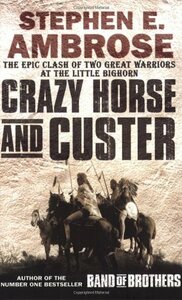Take a photo of a barcode or cover
dark
informative
Compare and contrast
A good look at the similarities and differences between these two late 19th century men and the times they lived in
A good look at the similarities and differences between these two late 19th century men and the times they lived in
I loved this book because of its focus not only on historical events, but personalities and cultures. Ambrose looks at the European American culture of the time with the same anthropological eye that he does Oglala (sioux) and other Indian culture of the time, with lots of commentary, but no judgment, on either. He reserves his judgment for the military and political decisions by the men he profiles in the book (not just Crazy Horse and Custer) and he can be downright brutal (and right on!) in such. He really tries to answer the question "What was he thinking?!" about so many men of that time, and his analysis is fascinating. And his capture of the political scene of the late 1800s in the USA -- really, has anything changed? My understand and respect for Crazy Horse is now vast. The scary thing is that American foreign policy now seems to be a lot like the Indian policy of the late 1800s...
adventurous
informative
medium-paced
This is one of the best contemporary history books I have ever read. Although somewhat fictionalized through conversations and motivations it is solidly based and supported by over 100 pages of citations and notes. It captures the full lives of both individuals bringing them together in their final contest at the Little Bighorn where Custer was killed. Reading it was a sad but fascinating revealing, and rewarding literary adventure into the post Civil War era, the great western expansion, and the inhuman treatment of Native Americans.
I'm going to be honest, I read this for a university course and I was expecting something different than what I got. What I was expecting: some mix of history and anthropology that would shed light on the Battle of Little Bighorn and the Sioux Wars. What I got: the former plus about 200 pages of tedious yarn spinning about military maneuvering. Not my cup of tea how Ambrose reclines in his armchair and plays Monday morning quarterback. Also probably out of date given what we know now about Native Americans of the Plains.
The parallel lives of the two war leaders that met at the battle of the Little Big Horn. The parallels are interesting as well as the contrasts of their two cultures. Ambrose gently lets some of the air out of the Custer myth that was generated by Custer's widow. He also gives us some understanding of Sioux ways of war and what Crazy Horse's innovations meant. Ambrose goes a little overboard on eulogizing Crazy Horse.
I appreciate Ambrose bringing as much of the lives of the women in both men's worlds to light as possible.
I appreciate Ambrose bringing as much of the lives of the women in both men's worlds to light as possible.



